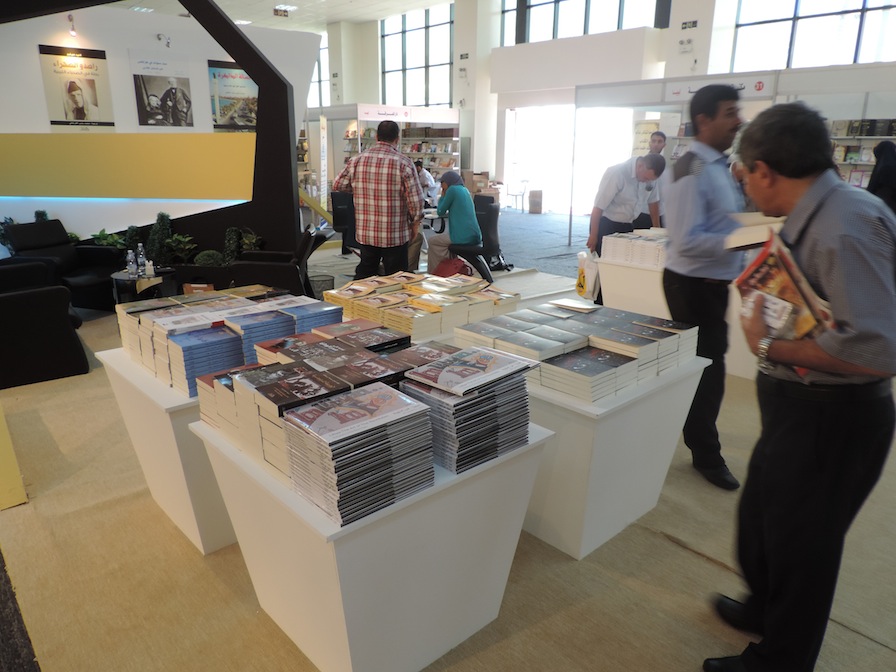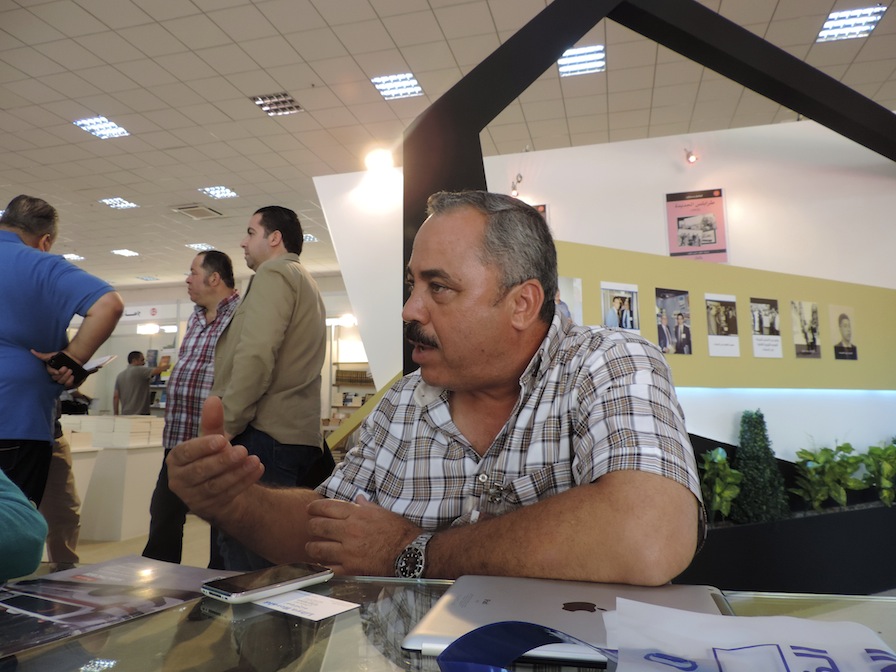By Houda Mzioudet.

Tripoli, 7 October 2013:
The Tripoli International Book Fair, which continues until 10 October, has attracted several publishing houses from . . .[restrict]across the Arab world. But one of the most prominent ones is a veteran Libyan publishing house, Dar El Fergiani. Specialising in books in Arabic, it has been participating in the fair ever since it started in 1981. Many of its publications are translations, according to Hisham El Fergiani, son of the founder of the company.
One of the highlights of the book fair is a French book translated into Arabic, Un taxi pour Benghazi (A Taxi to Benghazi), written by French journalist Marie-Lys Lubrano. In it she recounts her adventure inside Libya from the outbreak of the revolution to the fall of Qaddafi. She crossed into Libya in a taxi from Egypt, where she had been covering the Egyptian revolution.
Such books and others translations from different languages made Dar El Fergiani into a pioneer in the publishing sector. Dar El Fergiani is mentioned in the Lonely Planet Guide, according to Hisham.
Dar El Fergiani says it sold a significant number of books for the first two days of the fair. It and the turnout to the fair were a surprise for company director Samir El Fergiani. The keen interest of Libyans in purchasing books shows the keen interest of Libyans in purchasing books, mostly about Qaddafi and his regime, he says.

“We are happy with the turnout to the fair. Even on working days, people came in large numbers”, Hisham told to the Libya Herald. Foreign diplomats, too, were among the visitors.
Hisham’s father, Mohamed El Fergiani, was originally from Ghariyan. Hie moved with his family to Tripoli in 1928 when he was five years old. There he studied at the Islamic school (reconstruction of which near the Waddan Hotel has been stopped since the revolution). He later went on to teach in Tripoli schools. He set up a bookshop in the capital in 1953. Later it became known as Dar El Fergiani.
Apart from books in Arabic, it also publishes in English, French and Italian and it has over 50 titles of the most important references in Libyan history, both written and translated versions. During the 1970s, Dar El Fergiani printed postal stamps depicting Libyan heritage and folklore.
With Qaddafi’s nationalisation law in the 1978/1979, Dar El Fergiani suffered the fate of many private businesses: expropriation by the state. El Fergiani had four bookshops in Tripoli, including a publishing house.
“His ambition to own a publishing house, as in Lebanon and Egypt – the most prominent in the publishing industry in the Arab world – forced him to go into exile in Malta and set up a publishing house there,” Hisham told this paper. But even there his father encountered difficulties. He also tried to open a branch in Tunis in vain, Hisham added.
In 1981, he moved to London and opened a shop in Knightsbridge, then moved to West Hampstead.
The house became a world reference on Libya, with branches in Tripoli (three bookshops, one in Shara Mizran), Cairo and London, where it owns two bookshops and a publishing house.
“The two English bookshops sell English books about Libya. As for the publishing house, it produces, publishes and sells books on Libya,” Hisham explained.
What distinguishes Dar El Fergiani from other bookshops in London is that it has a section on Middle Eastern history and literature, particularly Libyan history. It specialises in translations of books about Libya from English into Arabic.
His father encountered difficulties when he first moved to London and he started his publishing house. He was totally new to the sector and books, all in Arabic, were not highly profitable, Hisham explained.
The London house started to translate Arabic books into English. In the case of Libyan history, little had been published. Most of that were travel letters and documents written by European consuls and expatriates in Libya in the 19th and 20th centuries. Mohamed El Fergiani reprinted them in English.
“A lot of the books about Libya that he translated had been lost or destroyed so he gave them a new life by printing 1,000 copies of them,” Samir stressed.
This year, Dar El Fergiani participated with eight new titles including Abdurrahman Shalgam’s Men around Qaddafi. It also published Qaddafi, Al Jazeera and I by Mohamed El Dib, former Al Jazeera correspondent in Tripoli. [/restrict]










